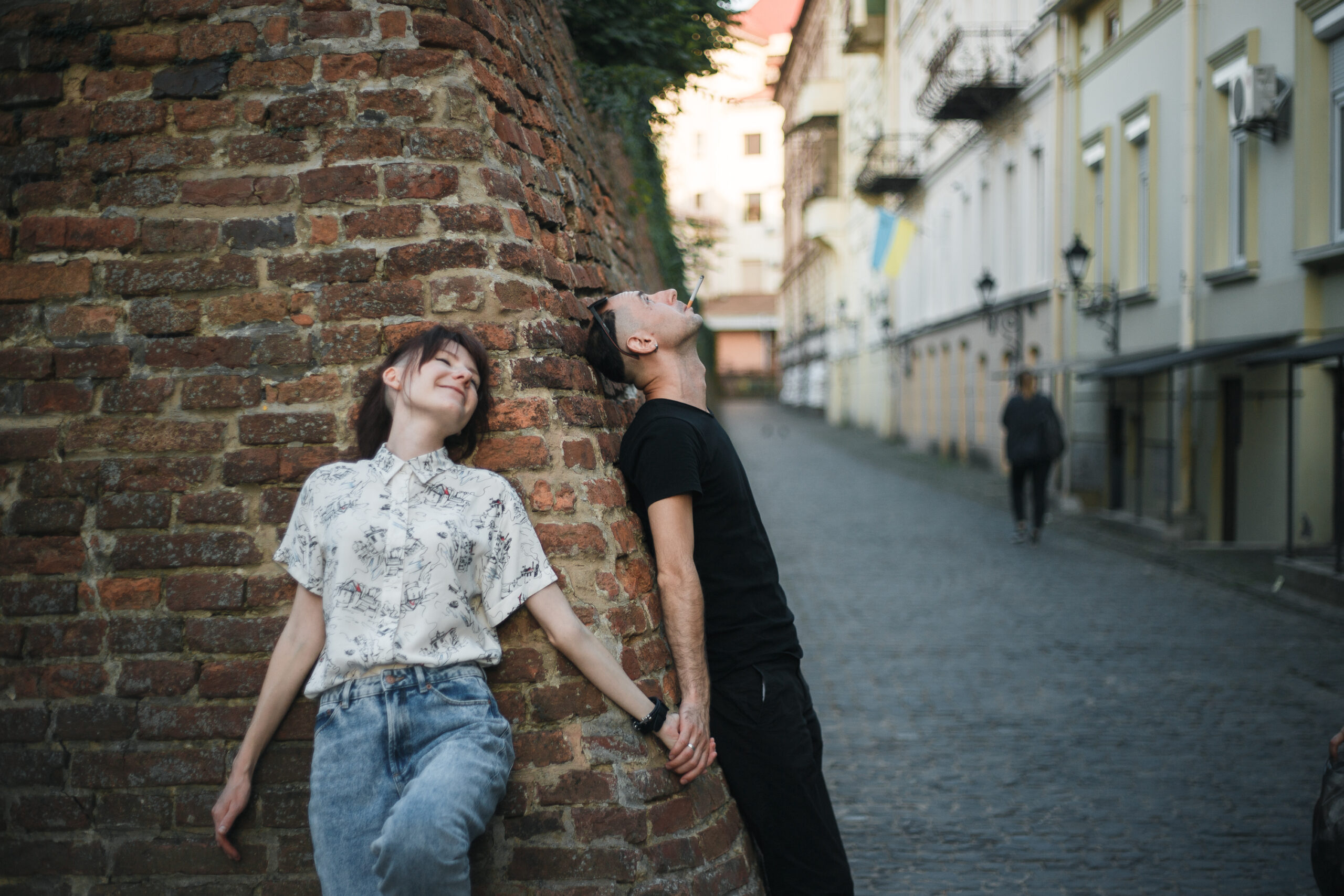
We meet Mirek Bodnar and Khrystyna Mykhailiuk in a bar in the center of Ivano-Frankivsk. Mirek is a Ukrainian poet, translator, and editor-in-chief of Drunken Boat. Khrystyna is a translator and director of the publishing house.
The founders of the Drunken Boat publishing house warned that they usually venture out of their neighborhood to the center very rarely and reluctantly, so we immediately agree on a long conversation that will begin here, at the table, continue on our way to the Pozytron neighborhood, where they live, and end at their kitchen.
At various stages, friends of Khrystyna and Mirek (many of whom are mentioned in the text) will join us. After all, as the characters of this interview say, Ivano-Frankivsk does not need a literary festival, because it is already a festival city itself.
How has your life changed over the past six months? Do you feel that returning to those versions of yourself is no longer possible?
Mirek: As for me, I don’t see any psychological changes in me, but I feel that our society has changed a lot, the whole nation actually. This change concerns, first of all, the complete rejection of everything Russian.
Khrystyna: Mirek, but on February 24, you also had a rejection in your library. Mirek de-Russified it.
M: Well, after all, it was not ‘complete de-Russification’. I left some Dostoevsky and Tolstoy, let them be on the shelf. Maybe someday I will finally read them.
Kh: Have you never read them?
M: No.
Kh: By the way, Prokhasko says he won’t throw them away, because one must know the enemy and their way of thinking.
M: However, I threw away all the books in Russian translation that I knew had already been published in Ukrainian. And even if I don’t have them yet, I will buy them later.
Kh: And I feel like I really don’t want any loud events now because it seems inappropriate and uncomfortable to me.
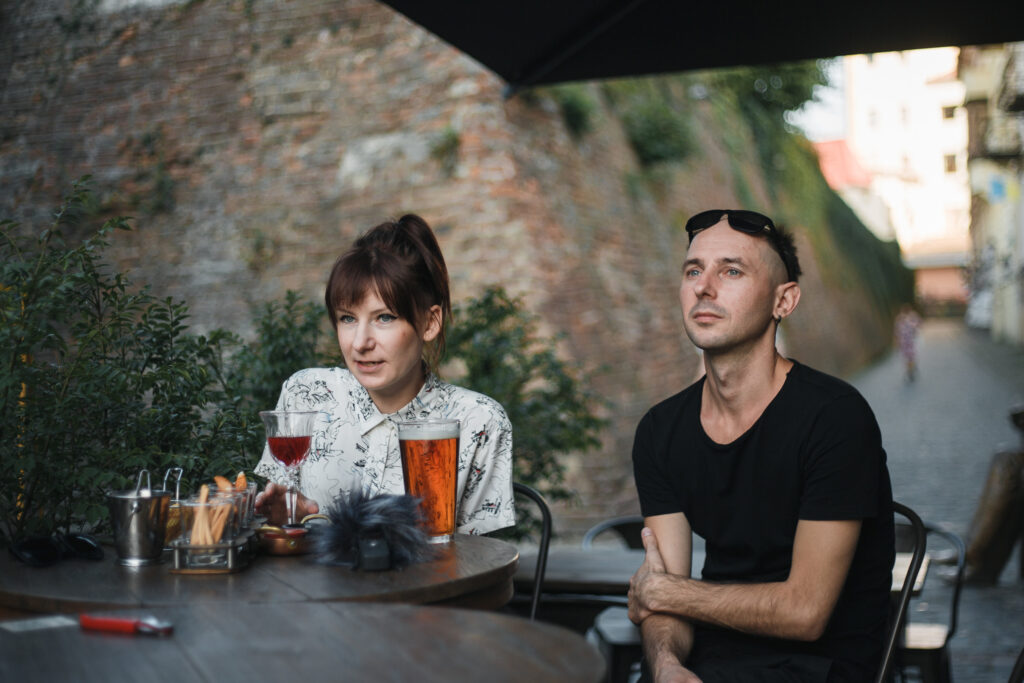
Many people I know personally said that after February 24, they could not return to reading books for a long time, although it was their daily practice before. And how did you deal with reading and what did you read during these months?
Kh: I always lack books very much. I need someone to give them to me, slip them to me and say: “You have to read it.” I read very fast. Even now, despite the fact that I have problems with my eyes. I do it, although the doctors forbade me to.
You know, there are cases when people buy a lot of books and never read them. In my case, it’s the opposite: I buy a lot of books, but I read them quickly and need more. Since the beginning of the escalation, I have read twenty books but one has especially tugged at my soul. This will probably be my book of the year—Wartime Notebooks: France, 1940–1944 by Andrzej Bobkowski. It’s a brilliant text describing how the French did nothing extraordinary during the occupation. It reminds me of what happens in our country when you are on the so-called home front, where there are no hostilities, and you worry about someone who is somewhere there. I read it and realized that nothing has changed since then.
Mirek hasn’t read any books since February 24, he’s only editing the ones we’re working on. However, he has such an activity: he writes down two news notes per day, which he chooses from information websites. It may be just a few lines, but there is an unobvious connection between them. And since February 24, these lines have been creating a kind of poetic chronology. At first, Mirek thought the poem would end when the war ends, but now he says he will stop recording the news when Putin dies. I didn’t expect Mirek to be so persistent, but I think it will be in his next book.
You give the impression of people remote from the literary environment. You seem to deliberately keep a distance from it. Or is this a false impression?
M: As happened historically, since I started writing poems, I have published several books and been included in the literary process in one way or another. I never liked going to presentations, performing or getting to know other poets. It just never interested me.
It seems with the younger generation it’s vice versa—they want to get into the circle of close ones.
M: Even the old generation wants this.
Kh: As Bukowski once said: “Like flies on the same turd.” Sometimes it’s interesting to talk to people from your field, but usually you only hear what you already know. And people from related fields can suddenly reveal something unexpected about literature to you.
M: As Bukowski wrote:
«The last one I want to drink with or listen to is a writer.».
Kh: But there is another point: we are trying to be so independent, and for this we need to have resources. We understand that when we go out to see someone, we use a lot of resources, both physical and financial because we can’t just drink one cocktail during the night, but we will order five each.
M: We don’t know how to drink moderately and we don’t have any investors. Therefore, when we know that we are going to publish a book, it is a priority. This disciplines us a lot.
The absence of parties is more about being pragmatic. Although we can give the impression of people who are partying a lot, a bit crazy guys, we have detailed budgets and we know that sometimes we have to limit ourselves in order to publish a book.
Kh: Since the first days of founding Drunken Boat, we have come up with a rule that during the working week, we respond to all emails received within a day. It seems that it was never violated, wherever we were. We can start answering them even when drinking. And if you have a hangover, it’s out of the question, you just have to answer.
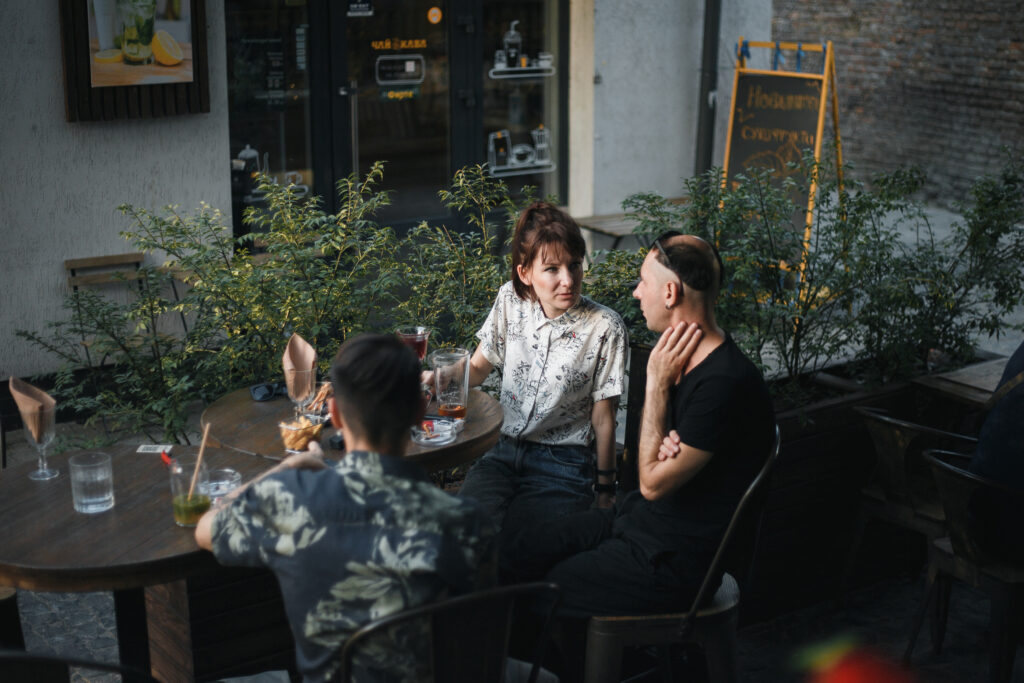
You founded your publishing house to publish the authors you want. But from a financial point of view, wasn’t it easier to find a publisher as crazy as you are and offer them a project or an idea for a publication?
M: We don’t sell ideas.
Kh: Exactly, we’ll suffer, but these are our ideas after all.
This is a matter of some kind of freedom: we do not approve any layout or author we publish with anyone. We decide ourselves what we like and what we don’t. This freedom sometimes costs us dearly, but we do what we do.
As it was with our first book.
We haven’t told this story publicly yet, but it started in the mid-1990s when I was a kid. One day I was playing at home sitting next to my dad who was watching TV. They broadcast a report about the National Bank which mistakenly printed and put into circulation a batch of 50 hryvnia banknotes with Hrushevskyi depicted on them, but also with a watermark, like on 100 hryvnias, with Shevchenko. My dad opened his wallet just for fun and saw that he had a 50 hryvnia banknote. He held it up to the light and noticed that the one from that defective batch fell into his hands. It could have been exchanged for a new one, but dad put it off, logically assuming that it would become a bonistic rarity one day. He decided to give it to me (because I was near him at that moment) in case of a special need.

And so, in 2015, Mirek and I told dad that we wanted to start a publishing house and that we had a lot of ideas, but absolutely no start-up capital. He replied that it must be time for that banknote, the existence of which I actually didn’t know. Saying that, if we could sell it, then all the money would be ours. After that, Mirek spent a whole month on various bonistic forums to learn its price and find a buyer. We sold those 50 hryvnias for 450 dollars, which we invested in the printing of our very first book—The Unfinished Crusade by Rafał Wojaczek. We were advised to keep this banknote for a few more years because the price would definitely increase, but we could not wait and have absolutely no regrets that we sold it then. There could not have been a more special occasion.
Therefore, publishing is a very selfish thing. After all, the point is not to just publish a book, but to do it exactly the way we want to.
And how did the full-scale Russian invasion influence your business—publishing new books? Did you have to freeze any of the projects planned for this year?
Kh: Even before the full-scale invasion, we published very little, one or two books a year. Surprisingly, this year, three are planned, which is our record. Apparently, this is a kind of compensation for the previous year. But this is also about a new awareness of the value of time: the realization of something important cannot be put off. So in July we finally published a book we had been working on for five years. This is The Last Night of the Earth Poems by Charles Bukowski.
The second book of this year should be ready by late October. These will be poems by Mirek Bodnar, selected and new. They are to be published under a title that is very similar to his first book …more, more, more, don’t stop! (the first one was titled More, more, more, don’t stop!). In total, there are 222 poems.
At the end of the year, we plan to print Psalm 44, a novel by Serbian author Danilo Kiš, whose novel The Attic we published earlier in 2020. Psalm 44 is especially relevant to our time: it tells about the war, the concentration camp and Maria, Jakob, and Žana who escape from it. The Ukrainian translation was made by Olena Dziuba-Pohrebniak, who also worked on The Attic.
The biggest problem publishers are facing today is the enormous increase in the cost of paper, which began before the [full-scale] war, but is now growing rapidly.
For example, in mid-August, the printing house calculated the cost of printing Mirek’s book for us. In two weeks, while we were preparing the layout, the price increased by 10 thousand hryvnias. However we had no choice, so we agreed.
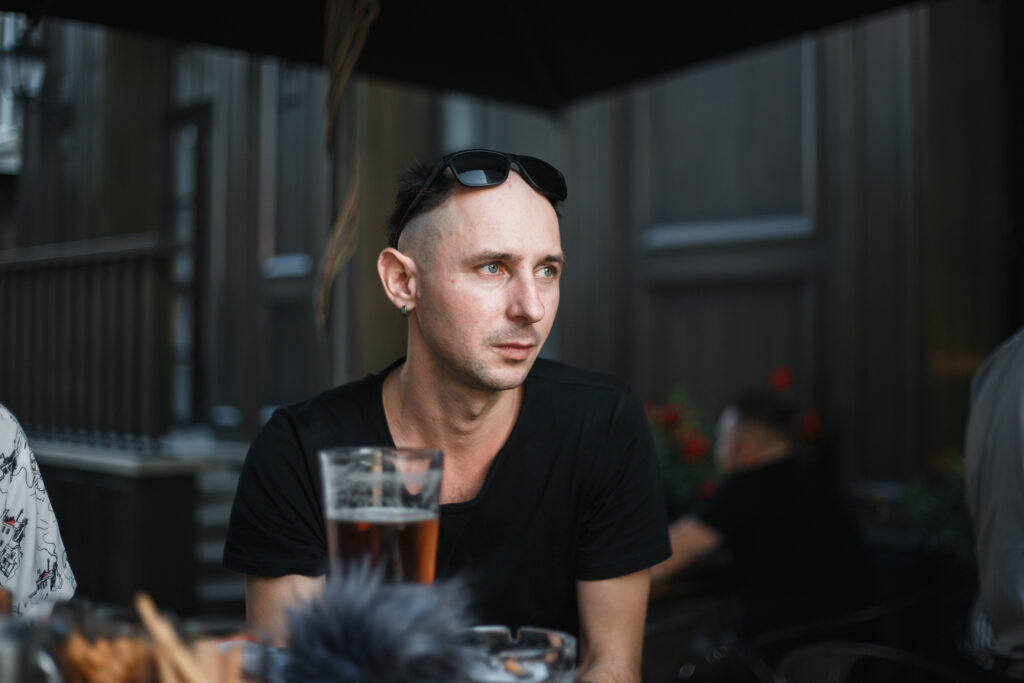
We had no choice also because many printing houses, in particular the one we worked with before, are located in Kharkiv. After February 24, most of them, if they even try to operate, do it in a rather limited mode. They physically cannot take the same volume of orders as they did before the [full-scale] war. Accordingly, the workload on printing houses in other cities has increased. To print a book takes twice as long: six weeks instead of three, as happened with Bukowski’s book.
We were very worried about that, felt uncomfortable with the readers who made pre-orders and could not speed up the process in any way. But our readers are cool and understanding of the situation. They were cheering us on, one reader even sent us wine to help us relax.
Despite everything, we have planned to publish three books next year. We have even received financial support for some of them. So, we will do everything that depends on us for the world to definitely see the books. Even if this world is so frightening and unsettling right now.
And how do you distribute roles in your publishing house?
Kh: We made our decisions 50/50. I’m responsible for more practical things and administrative issues: accounting, discounts with bookstores, etc. And Mirek works with artists and editors. I’m focused on how to sell the book after its release and how to position it. And Mirek is more about what it will look like and who will work on it. Once the book is released, Mirek in a way doesn’t give a fuck about it—what I’m gonna do with it, what I’m posting on Instagram. He is already thinking about the next book.
M: In fact, the Drunken Boat publishing house is just me and Khrystyna. Of course, we have illustrators, editors, and proofreaders, but all administrative issues are handled by just the two of us.
Kh: We know how to do everything and just do it: we load and pack books, we know all the clerks at the post office, where the department is good and where it is not, and which box to choose for packing.
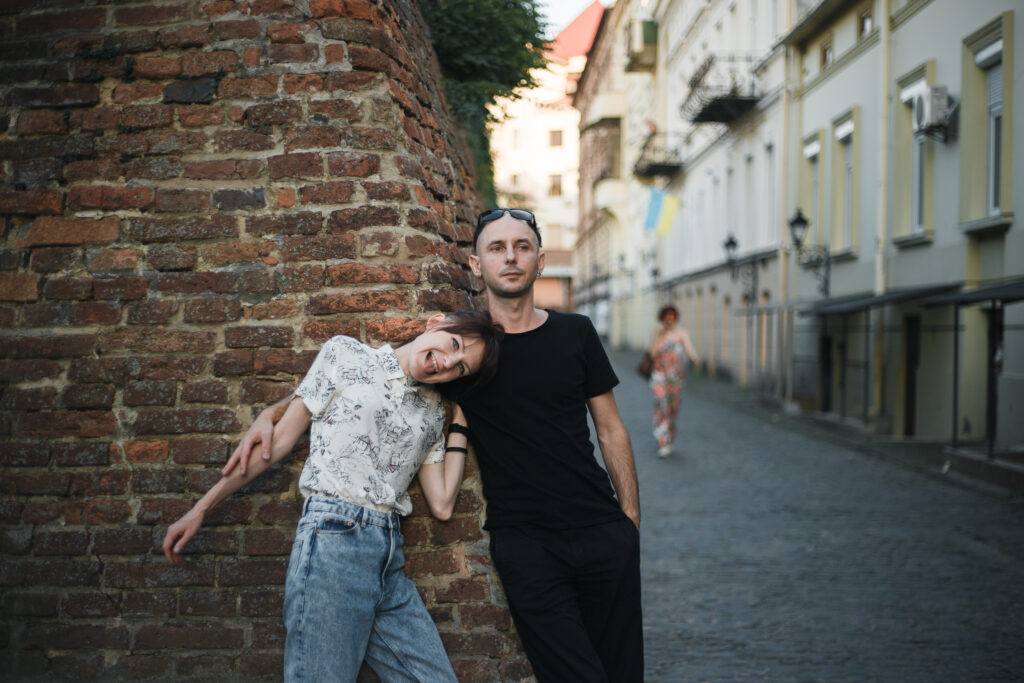
Let’s return to Charles Bukowski whom we have repeatedly mentioned today. The work on the publication of The Last Night of the Earth Poems lasted for five years. Mirek even managed to work at the factory, just like the book’s author at one time. What other things have you experienced to get closer to those whose texts you are working on?
Kh: It was a washing machines factory, night shift. Mirek worked there for two months, translating poems during the day. The work on this publication lasted for a very long time. I was rereading things yesterday, choosing texts for publication, and Mirek said to me: “I read this poem to Taras on the radio several years ago.” We did not publish it, but it was translated a long time ago.
The Last Night of the Earth Poems has 768 pages, 396 poems, as well as 26 black-and-white illustrations for each chapter created by Khrystyna Pyshch, an artist from Ivano-Frankivsk. Mirek was engaged in the selection, compiling and translation, and I edited the translation.
M: The biggest challenge I faced was choosing and structuring those poems. Buk was a very prolific author with about 50 poetry collections published (both during his life and after his death), in which poems were sometimes repeated. I began to study them and realized that there are 26 most important collections, let’s say, numbered (which are not selected poetry). Then I singled out from them an average of 15 poems that I considered the most interesting. That’s how we have 396 poems spread out over the book.
And the fact that at the end of 2017, I had to go to the factory was a kind of joke from Bukowski who spent half his life working as a handyman at all kinds of factories and plants. And I realized that the connection with the authors whom I love and translate actually exists. Because a year before that, in 2016, just a week before the publication of the book by Rafał Wojaczek, I broke my leg. This was my first fracture ever, and it was also a kind of greeting from Rafał, who during his life did various kinds of self-harm all the time.
It seems that publishing Bukowski’s poetry was not only a professional interest for you and Mirek. You also have a very personal story connected with this author.
Kh: I learned about Bukowski on our first morning together with Mirek in Lviv. He just picked up a book and while having his morning beer began to read to me his favorite fragments—either from the collection of short stories Hot Water Music or from the novel Women. Surprisingly for myself, I didn’t know about this author before. But as an excuse, albeit a weak one, I can say that I was quite young back then.
Now I think that it was a kind of test: Mirek wanted to see my reaction: he deliberately read the sharpest, most ironic moments, because they are, in fact, his favorites. If I didn’t like them, I’m afraid that we would go our separate ways. But I really liked them and I laughed heartily.
Later, of course, I read all the books by Bukowski available to me, and some of them even more than once. But that night, to consolidate success, Mirek took me to the Bukowski Bar, and I liked all that trash, too. That is, yes, we have personal stories connected with this author, but we wanted to publish him primarily because of his cool texts.
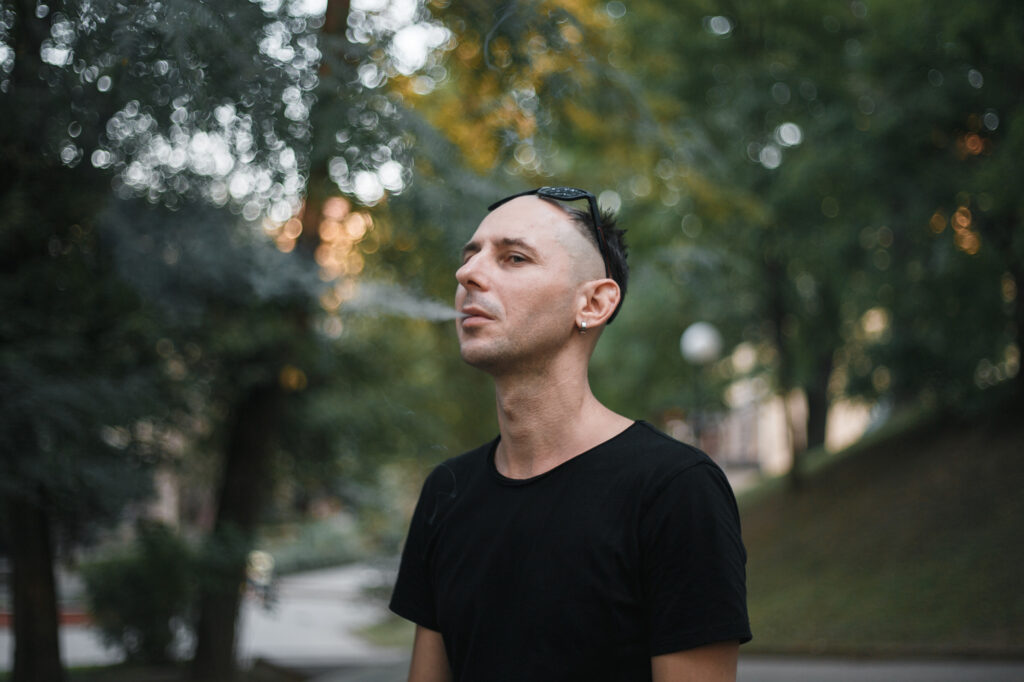
Kh: In 2019, we published the diary recording the few last years of Bukowski’s life The Captain Is Out to Lunch and the Sailors Have Taken Over the Ship in my translation, and this year we published his poems in Mirek’s translation, but we also want to publish some more of his prose. It will be such a trilogy by the author in Drunken Boat. As soon as I finish the translation of a book by Hunter S. Thompson, I will immediately come back to Buk again, but it will be in a year or a year and a half, I work slowly…
M: My story with Bukowski is that at first I hooked on his prose and almost didn’t look at his poems. But when I read all his collections of short stories and novels several times, I began to immerse myself in his poems. I realized that I shouldn’t have ignored them: it was the same Bukowski—sharp, ironic, funny, but in a small, condensed form. And I decided to translate his poems for Drunken Boat.
Who are the readers of the Drunken Boat publishing house and what are your work principles?
M: We don’t make notes, we hate them in our publishing house. We respect our readers and think that they are very smart, so they themselves will find out everything.
Kh: And also, when working with the translation of the text, we look up and Google everything: every character and story, car brand and the year it was produced. In general, we pay attention to such details. For example, sometimes you try to translate a term from American football—and it can take three days. You ask all your friends who know at least a little about it. And then you reduce all versions to a common denominator.
M: What does it even mean: “He’s on third base”?
Kh: Yes, what does this ‘third base’ actually mean? Maybe it was used in some ironic context. And as we often choose our favorite American authors for translation, we have to go into such details and understand what we are talking about. Same thing with Bukowski: there was a lot to learn about horse racing and the racetrack. Without it, you won’t be able to understand either this culture or what it is about.
M: This is a different culture, for which our Ukrainian language doesn’t even always have words. And sometimes you have to make up them, at least something related. This is like a puzzle.
Kh: Exactly. With fiction, you can translate a fragment in thirty minutes or work on it for ten days. And you can never tell a customer for sure when you will finish. That’s why when we work with translators, we don’t set any deadlines.
If we are told that it takes more time to delve into a certain fragment, then as translators we understand that this is normal. It pisses me off a bit because, on the one hand, you have a list of twenty authors that you could publish in a year, but on the other hand, with such a pace, the quality may suffer.
Speaking of the publication of Mirek’s poetry collection, in this project, you are an author, editor, and publisher at the same time, aren’t you?
M: I don’t feel like a publisher here. Because I don’t think: now that we publish my book, how will we sell it, how will we earn a lot of money on it? About a year ago, I realized that I have a certain body of texts that I wrote and published in different publishing houses, which were published in different books. Now I don’t like a lot of what was published earlier. At the same time, this is an opportunity to collect what I actually like to publish under one cover. So why not do it in my own publishing house?
In fact, no publisher that published my collections has ever dictated its terms. There were no such situations where someone said that some texts didn’t fit or that we should throw something away.
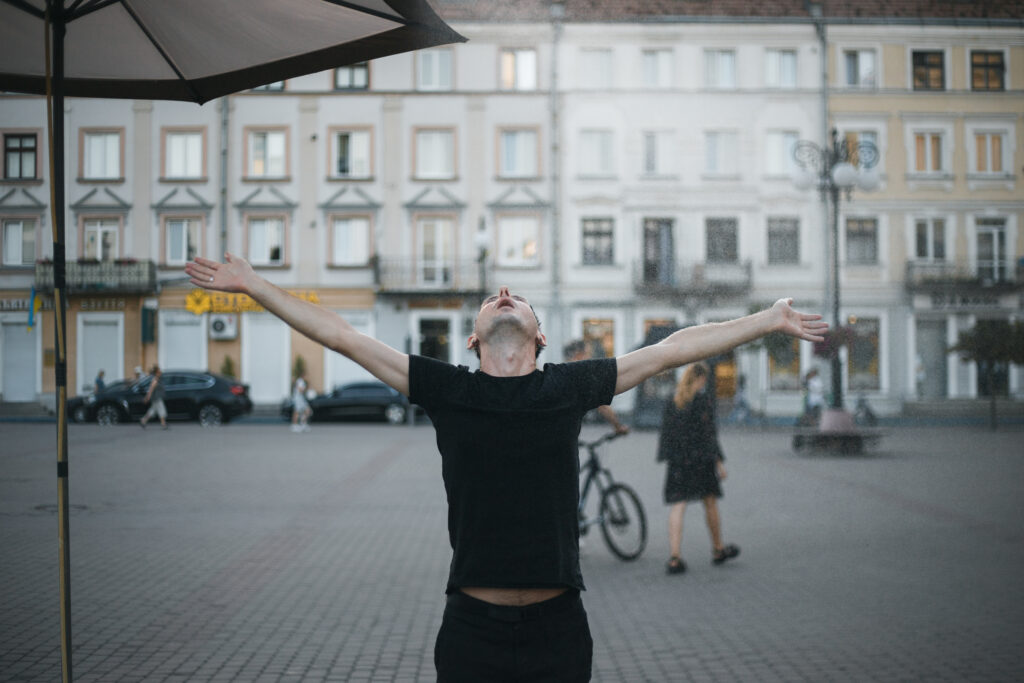
Let’s talk a little about what the city and its cultural and artistic environment were like when you were just starting to get to know contemporary Ukrainian literature and those who created it.
Kh: Mirek hung out a lot more back then.
M: I finished school in 2002. Actually, that’s when this whole literary crowd thing started for me when Roman Malynovskyi and I studied at school and lived in the neighboring flats: he was on the eighth floor and I was on the fourth. From our windows, we could see a library just near our house. There we came across the eighth and ninth issues of the Chetver magazine. We took them to read and it was, in fact, a revolution in our literary worldview. Because before that, we only hooked on the school program reading classics, in particular science fiction, like Ray Bradbury and Isaac Asimov. And when I got the Chetver magazine in my hands, I discovered postmodernism.
When we finished school and entered the university, we began going out downtown from time to time.
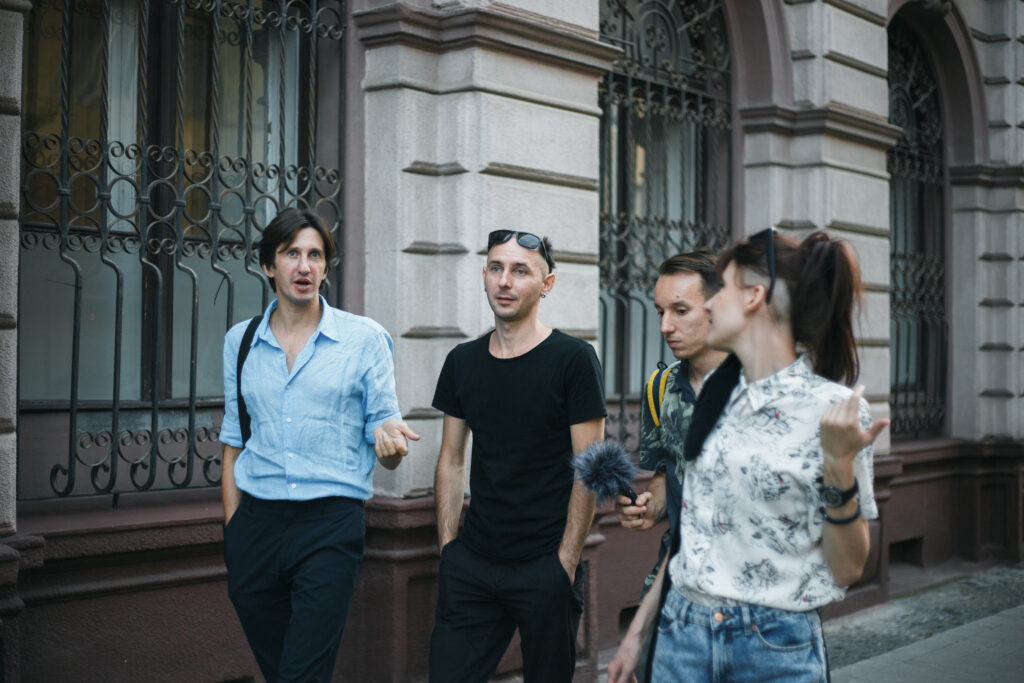
So you had the life of such district kids.
M: Yes, I can’t remember us going out anywhere before that. We probably went to a bookstore once or twice. There was a used bookstore and another one next to the place where Lileia-NV is now. There was a large Znannia bookstore opposite [the house] of Prokhasko, where a sports clothing store is now, and the Arka bookstore opposite the public restrooms.
But even after entering the university, our forays downtown were still cautious, until in the spring we saw an announcement on the Arka doors that there would be a meeting with the writer Yurii Andruhovych at the Peters cafe. So we decided to go see a living writer (finally). That was the first presentation Malynovskyi and I attended.
Since then, we started regularly attending those Chetver presentations organized by Vasyl Ivanochko from the Lileia-NV publishing house. During the spring of 2003, we saw a whole series of events, and the whole Stanislav phenomenon was there. We already knew the authors we were going to see: Izdryk, Prokhasko, Yeshkilev, Lysheha, Mariia Mykytsei, and Anka Sereda. Those were all representatives of that legendary Stanislav phenomenon, which we learned about from those two issues of the Chetver magazine.
Kh: I’m four years younger than Mirek. We looked at their group and thought that they were very cool. We already knew about the Stanislav phenomenon, but I learned a lot from the Halytskyi Korespondent newspaper. Especially from the last pages on culture and the cult of personality.
I first read The Island of KRK by Izdryk. I found this book in a library of the Smerichka summer camp in the mountains, and only then learned about Chetver. How did that book even get there? I was 15 and didn’t understand anything, but I was extremely intrigued.
I never got to visit Peters, but it was just the very beginning of Chimera, a place where such presentations were also held. We learned a lot through music. Speaking of Chimera, I first came there for a concert of the Pan Pupec band. For some reason, we first knew who Karna and Flit bands were, and only then were the writers.
M: The last literary event held at the Peters cafe was the presentation of the collection K by Andrii Zhurakivskyi.
For me, in the early 2000s, Ivano-Frankivsk and its artistic life revolved around the now iconic and legendary formation Session 11 which was established around Andrii Zhurakivskyi. They were engaged in music, literature, and performances, which were then held in the Ivan Franko cinema (now Lumière) or in the Puppet Theater, where concerts were held.
Kh: We keep trying to promote Session 11 and their music wherever we can. When we published William Blake, we made a video of how AR works with images illustrating the book and added their track to it as well.
M: They were a little older than us, but we were friends with everyone, everything was so interesting. Andrii gathered everyone around him and was, in fact, a very good writer. We even planned to republish all his texts, both prose and poetry. But this was done by Vasyl Karpiuk in the Discursus publishing house.
One of those earliest memories is also related to Roman Malynovskyi. It was the year 2002 or 2003. We were walking along Stometrivka [the central pedestrian street] and faced a dude. He looked so cool: wearing some rags and disheveled. We thought then that it would be cool to become acquainted with him. And then in a week or two we came to Taras Prokhasko’s presentation and realized that the cool dude we met was the writer Taras Prokhasko.
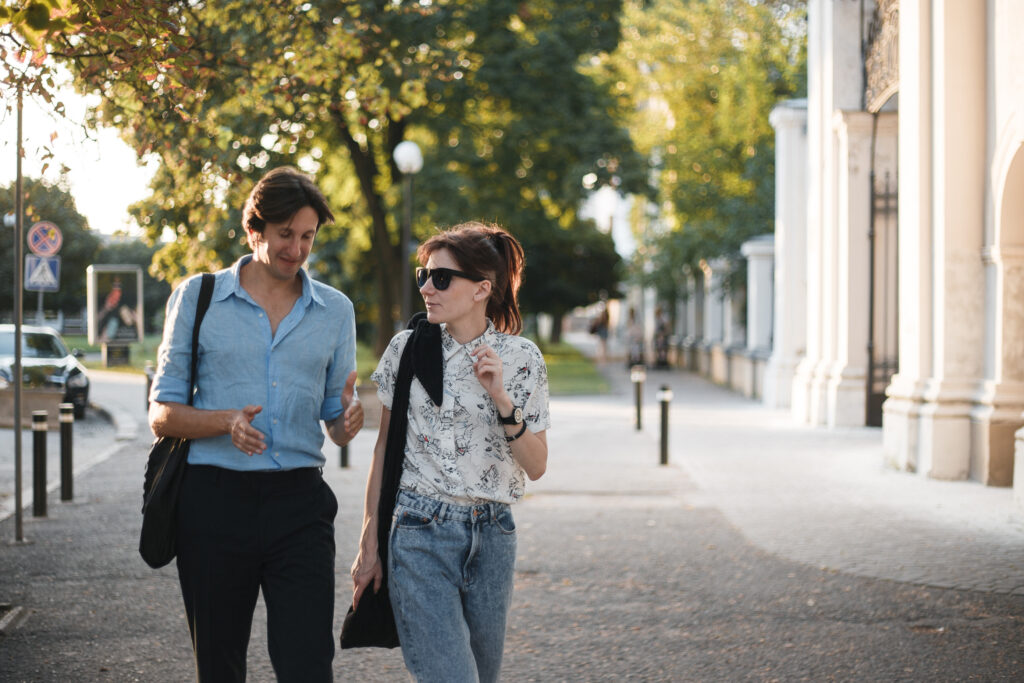
During the period when you were fond of reading Chetver, do you remember a text that deeply touched you, perhaps one of the authors had a special influence on the formation of your personal landmarks in literature?
Kh: It must have been Perverzion by Andrukhovych. I even told him about it: that I was extremely impressed by the character of Stas Perfetsky.
I remember I went to Lviv for the city’s anniversary celebration or something. We were studying in the eleventh grade and didn’t have the opportunity to spend the night even in a hostel. So we slept on the floor under the ticket desks. And then it seemed to me that I saw Stas Perfetsky at the railway station. That it was him, the man walking there and buying tickets in the middle of the night. At that time, I reread Perverzion three or more times. And I still have such a magical memory of that station. I think that I actually saw Stas Perfetsky.
I once approached Yurii Andrukhovych at the Vagabundo art space and said: “Please tell me honestly. Maybe it’s an inner child speaking in me now, who started reading you at a young age, was very fascinated by all of that and took it at face value. But does Stas Perfetsky actually exist? Because I thought I saw him in 2006 or 2007 at the railway station under the ticket desks. Could it be him?” And Andrukhovych answered: “It was definitely him, why are you even asking?” So, for me, the applied function of art and this literature of Frankivsk found something to be embodied in.
M: The book I still consider to be the key one is Wozzeck by Izdryk. I first read it when I was 16 or 17 years old and I couldn’t get it at all, but I knew it was something very cool. After that, I reread it every two years and…
Kh: And you still don’t get it.
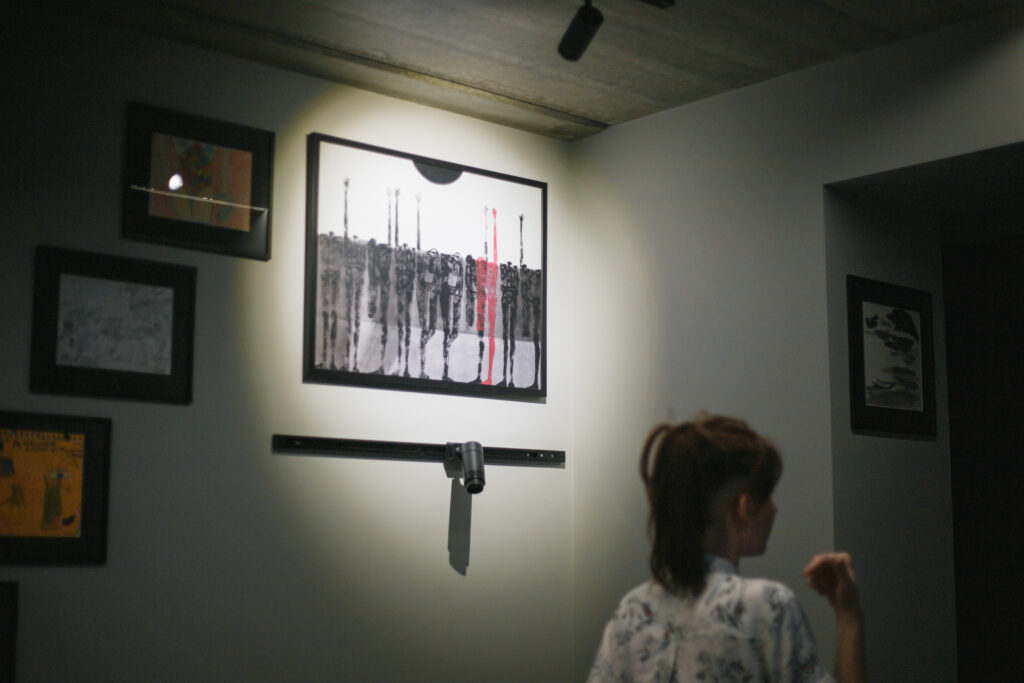
M: No, I discover something new every time. This is a perfectly written book in terms of stylistics. It is about what you can do with language, words, and your mind. How the author, main character, author-character, character-author, and the reader can be shuffled. It has everything in it. Reading Wozzeck, you simply find yourself living in this book: in its author, main character, you live in its language. I’m not sure if I’ve ever said this, but for me, this is the most important book in all of Ukrainian literature.
At the same time, Anna’s Other Days by Taras Prokhasko is equally valued for me. This book is also an absolute universe, which contains all the paths of life, all the stylistic discoveries of the 20th century, and all this postmodernism and modernism. When I read it for the first time, it was that very edition by the Smoloskyp publishing house of 1998. Everyone thinks that these are four short stories, but Taras said in an interview that he thought of them as mini-novels. Only later, the Kalvaria publishing house republished it with an addition of two short stories: A Burnt Summer and Lexicon of Secret Knowledge.
There is also the third book, Perverzion by Andrukhovych. For me, these are the three greatest books of Ukrainian literature. Both contemporary and not.
Kh: And for me, The UnSimple is such a text. Although I first read it when I was almost thirty or so. I started many times and could not finish reading it. And now I reread it every year, the last time I did it was this spring. I realized that sometimes it takes many years to get to this text.
Let’s talk about the city and how it affects your lifestyle and the work of the publishing house. Why is it important for you to stay here, don’t you feel the need to experience life outside Ivano-Frankivsk?
Kh: In fact, it’s some kind of rootedness that you don’t even think about. It is very natural. There is a city where you feel the best, so there is no need to verbalize it in any way.
We lived in Lviv for a year. It might even be me who convinced Mirek to move back. Although everything was okay there: the acquaintances we made and experiences we had. I think we are most efficient in our city. And the passing of generations here happens very informally: at some gatherings, exhibitions, presentations, and events. You are just present with everyone else, and it goes naturally.
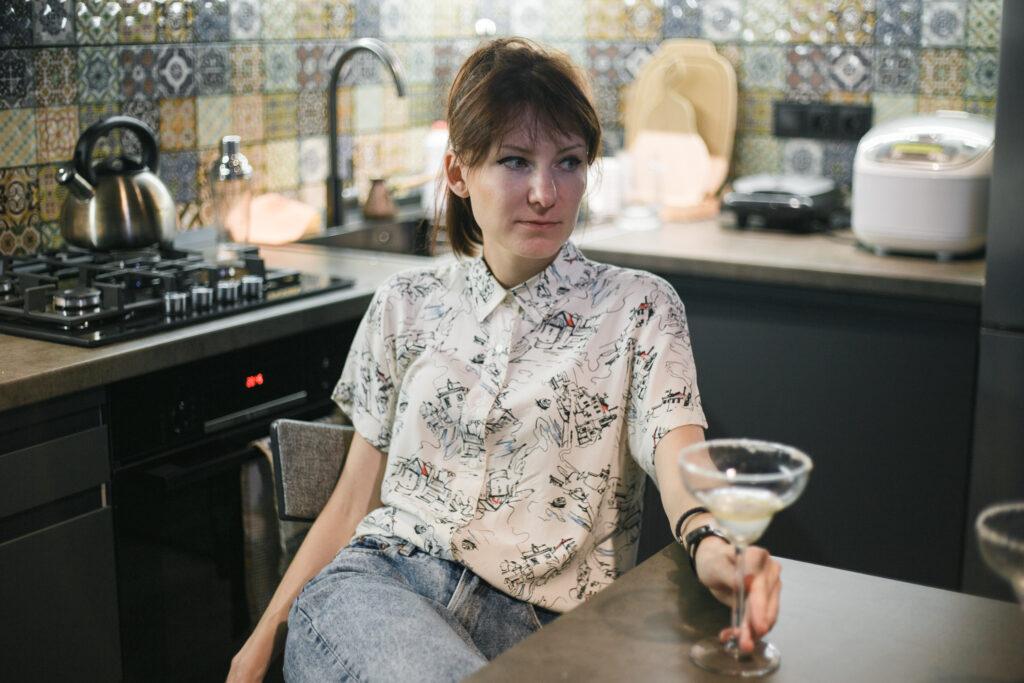
Many people from the cultural industry seek to live in bigger cities, capitals, to fulfill themselves, and to interact with a wider circle of colleagues.
Kh: I’ve never felt Ivano-Frankivsk as a provincial city.
M: Those are flawed people.
Kh: It’s like they probably have a province in their head.
M: This will be a scandalous interview.
Kh: God, maybe finally there will be a scandal on our street, we are trying so hard every time, but it doesn’t work.
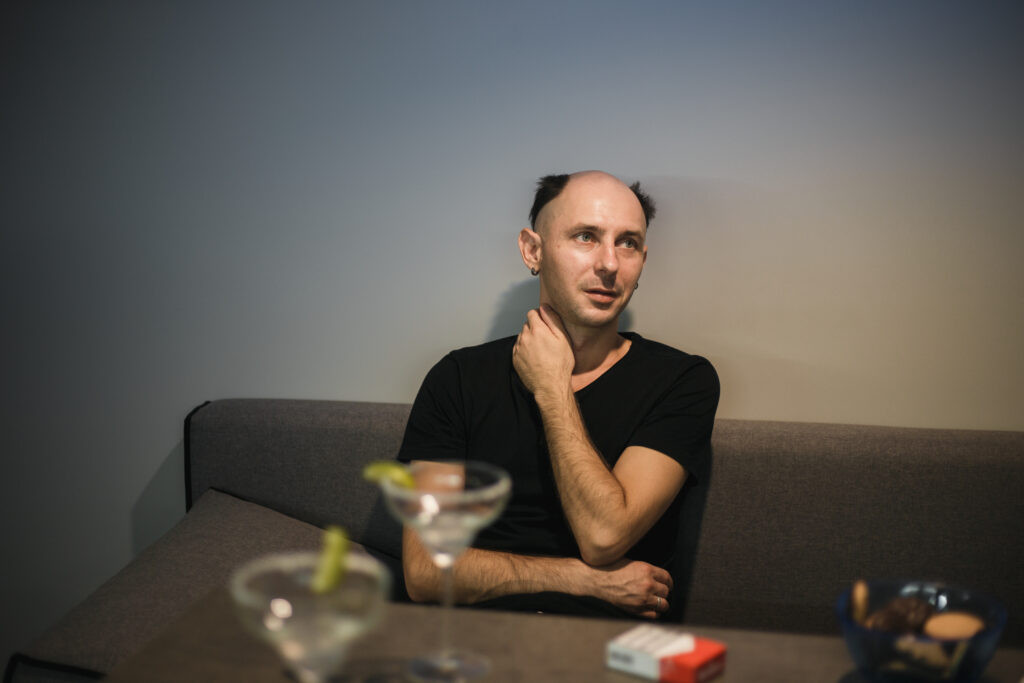
Kh: It’s just that to make a book, you need to have a layout designer, designer, accountant, etc. All this is much more convenient to have in Ivano-Frankivsk, where you don’t spend three hours getting somewhere in one direction or the other. The level of professionalism is the same, you do business, but just spend less time on logistics, and more time is left on things that really matter. Such as sitting like this with friends, having a drink and talking.
I do not know any publishing house with which our layout designer Ihor Dunets hasn’t worked. We met him not here, but at Book Arsenal. It was the only time when we went to the festival to sell our books. Ihor just came up to us and it turned out that he was not only from Ivano-Frankivsk but that he also lived five minutes from our house.
For us, it is important to be present during the process of layout design. It’s a little crazy shit, but Mirek has to see the work on each book, so we do it all together at our place. But, apart from us, Ihor cooperates with all Ukrainian publishing houses. He is a very cool professional who lives with us in the same area.
It’s good that you mentioned festivals. Despite the fact that Ivano-Frankivsk has its own rich literary history and many writers, translators, designers, publishers, and other market players live and work here, the city still doesn’t have its own festival, a major literary event.
M: Every day is a festival here because the city itself is a festival.
Kh: Festivals are targeted at institutional support and recognition, etc. Well, what kind of institutional support could be near the GOST bar? You just stand there, drink, say something, and ask Taras Prokhasko if he will finally write that promised novel.
M: You go get a glass of cider and you already have a festival.
Kh: There is no need to have a festival, there is no need to structure anything. What for? If everything is already happening. Roughly speaking, somewhere deep we had everything that happens around literature. Perhaps this is a slightly snobbish position from the point of view of those who live in Ivano-Frankivsk. But why do we go to the festival? To sell our books?
M: We went to the festival only once during the seven years of the publishing house’s existence. Why didn’t we go in the following years?
Kh: Because we don’t give a fuck. It takes too much time that we could use to work on our books.
M: Right. However, we took part in Porto Franko and TRANSLATORIUM. Although in their cases, the situation is slightly different, they are not purely literary festivals. The first one is very interdisciplinary and the second is more specialized, focused on translation.
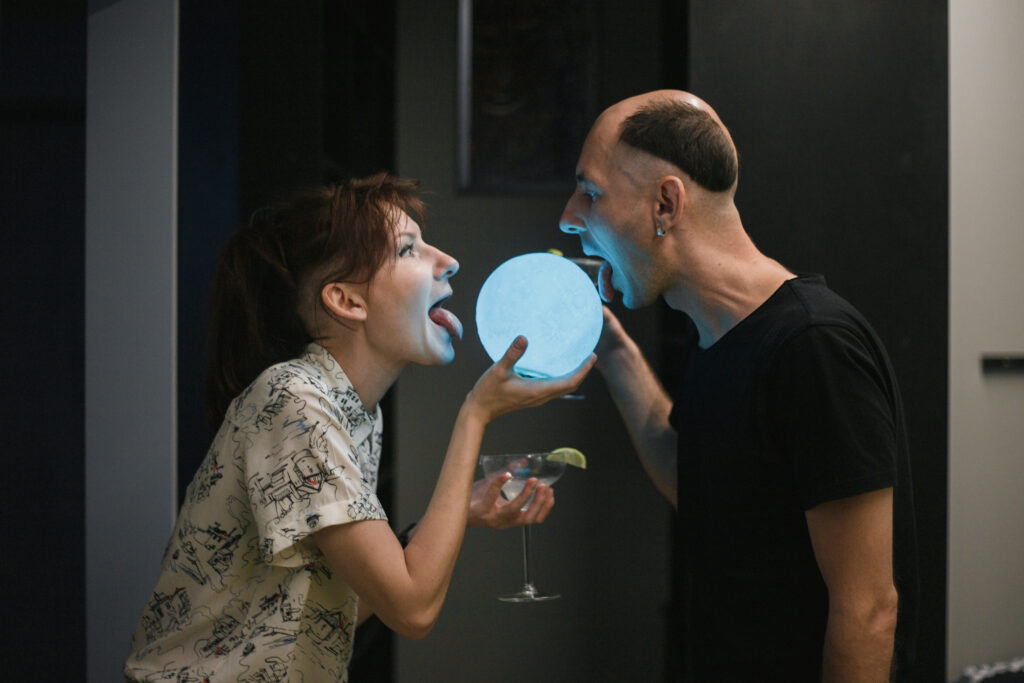
Perhaps the fact that nothing has appeared over all these years can be explained by the disinterest of the literary environment itself, cannot it? That is, if everyone is okay with everything, then this potential of the city as a platform for literary events won’t be realized by itself.
Kh: Luckily, in Ivano-Frankivsk, there is a feeling that everything and everyone is at arm’s length. If you want to see the writers who live here, you don’t have to do anything special: just go outside, walk through the city center, wander, for example, into a gallery or a bar, and you will definitely meet one of them. You can approach everyone and talk if you have something to ask or say.
However, speaking of performances or literary readings, I’m just not a fan of them. Firstly, it’s often boring—not all authors read their texts well. And secondly, for me, reading is a kind of mystery, something that should be done alone with the author. There is you, there is an author, and there is a book between you two, that’s it. That’s the point. I rarely like when a text is read in public. For it to fully unfold, I need silence and concentration.
The potential of Ivano-Frankivsk as a literary site lies in something else. Festivals can be held elsewhere. And here is a quiet harbor, the port of Frankivsk, where you can come to take a breath, drink rum, talk to important people and think about important things.
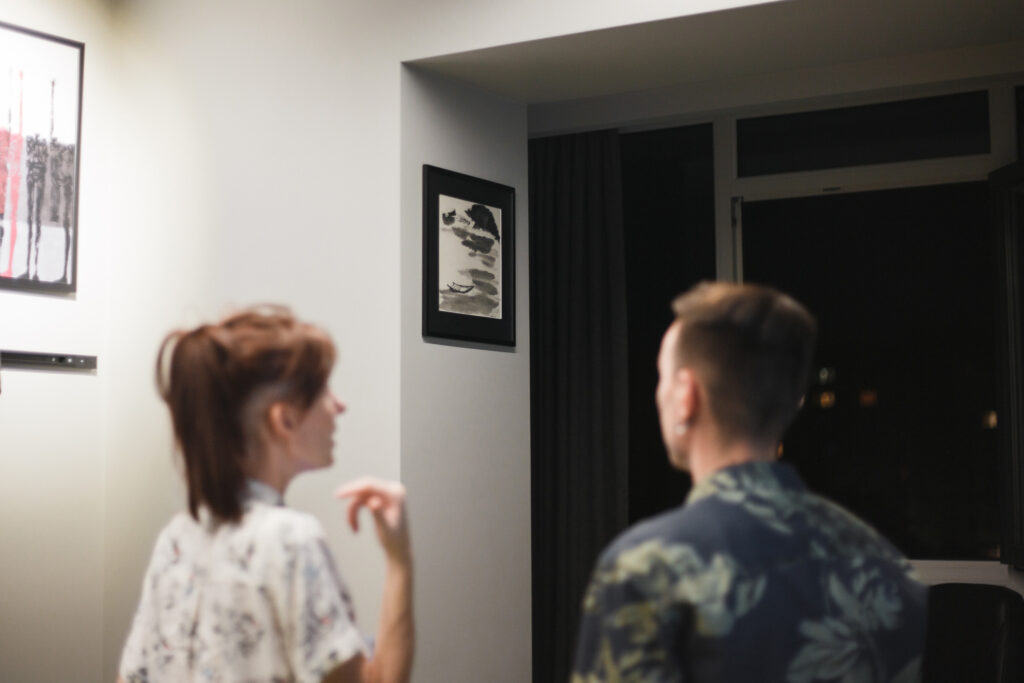
And have you ever been interested in the history of the Impreza Biennale? In recent years, I have observed a lot of reflections, memories, and materials about those international exhibitions in Ivano-Frankivsk in the early 90s.
Kh: When I was a first-year student, I prepared an abstract about Impreza, and then it turned out that my professor who assigned it to me was the wife of one of its participants. It’s great that it was held, it made a good impact.
M: It doesn’t impress me that much. Same as David Bowie. He doesn’t impress me either as a musician or as a personality. Impreza hasn’t really influenced us, and neither has David Bowie. We were influenced by Iggy Pop, as well as the Chetver magazine. In fact, why talk about them? Everything has already been recorded, all the writers and artists have been sorted out, everyone is already a cult figure in their own right.
M: Returning to your question about the city: for me, Ivano-Frankivsk is not some geographical or physical space. For me, it is a few people who live in it. First of all, it’s Taras Prokhasko. As long as Taras lives, Ivano-Frankivsk exists for me. Perhaps, later we will try to offer a different Ivano-Frankivsk, but now I can’t, because Taras means a lot to me.
Photo by Oleksandra Sosnina
A series of interviews «Between Generations» —conversations with representatives of literary generations in Ivano-Frankivsk and the region—is an attempt to find a connection between generations of literary figures, both in reflections on the past and thoughts on the present in times of war.
This series is published with the support of the PEN Ukraine Scholarship Program.

